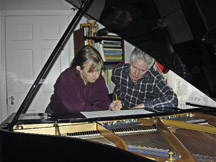Opera, you say? The image of a jealous clown or Teutonic warriors belting out a high note comes to mind.
And could there be anything musical in a three-hour play about the declining years of a legendary American explorer?
John McEveety Woodruff of Jersey City and Jim Lahti of New York plan to change expectations with their opera, “Meriwether.”
The work chronicles the final years of Meriwether Lewis of Lewis and Clark fame – the duo explored the American West to the Pacific Ocean – before Lewis committed suicide in 1809.
Woodruff, a writer, musician and piano technician who lives with his wife and college-age son in downtown Jersey City, was the librettist (lyricist), while Lahti composed the score.
The project, which was three years in the making, was completed last year and is currently being presented to opera companies in the Midwest and northwestern United States. It has attracted interest from the South Dakota Symphony based in Sioux Falls, S.D. A recording of the opera was done in January 2008 at New Jersey City University, where Woodruff is pursuing a masters degree in music composition.
‘Tough to sell suicide’
But Woodruff admits that the opera may be years away from gracing the stages of the Met or La Scala.
“This is three hours long, and it’s difficult to mount something like this,” Woodruff said. “This is the worst economic environment and it is pretty tough to sell suicide.”
“However, we love what we’ve done.” – John Woodruff
________
The story
Lahti and Woodruff’s three-act opera begins in 1806, after Lewis and Clark returned from their two-year expedition known as the Corps of Discovery. That landmark journey added such places to the U.S. map as the Rocky Mountains. The trip also resulted in the discovery of 178 new plants, like Indian tobacco, and 122 species and subspecies of animals, including the Bald Eagle.
Sacagawea, the Shoshone Indian who guided part of the Lewis and Clark expedition, vocalizes the impending doom in Lewis’ life at different points in the opera: “I chant the ruinous fate of one man!”
What unfolds is Lewis trying to adjust to life in civilization but instead unraveling, first with Clark’s announcing his marriage engagement, then with Lewis’ failed marriage proposal to a childhood friend. It all culminates with his suicide in Tennessee.
This eclipse of his existence is expressed in the haunting line, “Why in my brightest days should a darker hour descend and blind?”
Turning history into opera
Lahti and Woodruff had known each other since 2001, but started collaborating in 2005 when Woodruff mentioned to Lahti that he wanted to commit Lewis’ dark decline to music.
“I had already become a fan of John’s writing, quite impressed with the power of his words,” Lahti said. “He had mentioned to me his project on Lewis and I was hooked, since I am also a big history buff.”
Then, the pair spent months reading scholarly texts and the sensationalist tabloids of Lewis’ day.
When it came time to conceive, they weren’t bickering parents on the level of the legendary team of Gilbert and Sullivan mounting the Mikado. Instead, they engaged in collaboration by separation.
“I was the chief technician at Bard College [in upstate New York], so I would go upstate each week to write, as I like being around nature,” Woodruff said. “I would write a scene and chew on it and we would sit down to revise, and continue this process until we got a first version.”
Lahti said his task was to retain the beauty of Woodruff’s writing without the opera becoming a string of musical speeches or songs thrown together.
“Sometimes, John would write such beautiful prose that, rather than it being sung, I would just put music as background to accompany the spoken word,” he said.
Besides using American history as their guide, there were the musical influences. Although Woodruff admits to not being a huge fan of opera, he finds himself enjoying the works of Mozart and the 16th century Italian composer Claudio Monteverdi. Lahti looks to modern inspirations such as Stephen Sondheim, of West Side Story and Sweeney Todd fame.
Although their creation may take awhile to find its way in the world, Woodruff is nonetheless thrilled to have something to present.
“It is fun to watch the confusion of my friends and family,” Woodruff said. “I think they’re more surprised, as some of them are not opera fans and they have all been wowed by ‘Meriwether.’ ”
To learn more about “Meriwether,” visit www.meriwether.org.
Ricardo Kaulessar can be reached at rkaulessar@hudsonrreporter.com.
